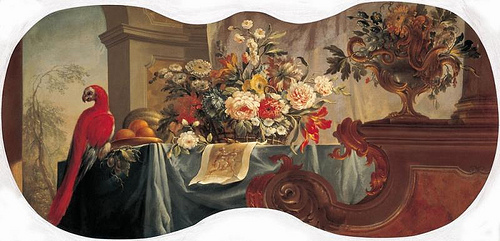bemissionary
v. to annoy with missionaries
Language
His Mark
The longest word in Shakespeare appears in Act V, Scene 1 of Love’s Labour’s Lost:
O, they have lived long on the alms-basket of words.
I marvel thy master hath not eaten thee for a word;
for thou art not long by the head as
honorificabilitudinitatibus: thou art easier
swallowed than a flap-dragon.
It’s the ablative plural of the Latin honorificabilitudinitas, “the state of being able to achieve honors.” And it can be rearranged to spell hi ludi, F. Baconis nati, tuiti orbi, which means “These plays, F. Bacon’s offspring, are preserved for the world.”
So that settles that.
Misc
- Q is the only letter that does not appear in any U.S. state name.
- 6455 = (64 – 5) × 5
- North Dakota’s record high temperature (121°F) is higher than Florida’s (109°F).
- UNNOTICEABLY contains the vowels A, E, I, O, and U in reverse order.
- “An odd thought strikes me: We shall receive no letters in the grave.” — Samuel Johnson
Anagrams
SOFTHEARTEDNESS = OFTEN SHEDS TEARS
WILLIAM SHAKESPEARE = I’LL MAKE A WISE PHRASE
ROBERT LOUIS STEVENSON = OUR BEST NOVELS IN STORE
HORATIO NELSON = ON, THEN, O SAILOR
SAINT VALENTINE’S DAY = NAY, A LASS INVENTED IT
THE UPHOLSTERERS = RESTORE THE PLUSH
TO CAST PEARLS BEFORE SWINE = ONE’S LABOR IS PERFECT WASTE
ANIMOSITY = IS NO AMITY
PRINCESS DIANA can be rearranged to spell ASCEND IN PARIS.
In a Word
abuccinate
v. to announce with a flourish of trumpets
Certainly, Officer
It’s said that police sergeants in Leith, Scotland, used this tongue twister as a sobriety test:
The Leith police dismisseth us,
I’m thankful, sir, to say;
The Leith police dismisseth us,
They thought we sought to stay.
The Leith police dismisseth us,
We both sighed sighs apiece;
And the sigh that we sighed as we said goodbye
Was the size of the Leith police.
If you can’t say it, you’re drunk.
In a Word

picqueter
n. one who arranges artificial flowers for a living
Arnold Bennett was surprised to find no fresh flowers in George Bernard Shaw’s apartment.
“But I thought you were so fond of flowers,” he said.
“I am,” Shaw replied, “and I’m very fond of children too, but I don’t chop their heads off and stand them in pots about the house.”
A Field Guide
Medieval sportsmen invented collective nouns for everything from owls to otters. Less well known are the terms they invented for people — this list is taken from Joseph Strutt, The Sports and Pastimes of the People of England, 1801:
- a state of princes
- a skulk of thieves
- an observance of hermits
- a lying of pardoners
- a subtlety of sergeants
- a multiplying of husbands
- an incredibility of cuckolds
- a safeguard of porters
- a stalk of foresters
- a blast of hunters
- a draught of butlers
- a temperance of cooks
- a melody of harpers
- a poverty of pipers
- a drunkenship of cobblers
- a disguising of tailors
- a wandering of tinkers
- a malapertness of peddlers
- a fighting of beggars
- a blush of boys
- a nonpatience of wives
- a superfluity of nuns
- a herd of harlots
In a Word
clinomania
n. an excessive desire to stay in bed
“The happiest part of a man’s life is what he passes lying awake in bed in the morning.” — Samuel Johnson
In a Word
hallelujatic
adj. containing hallelujahs
